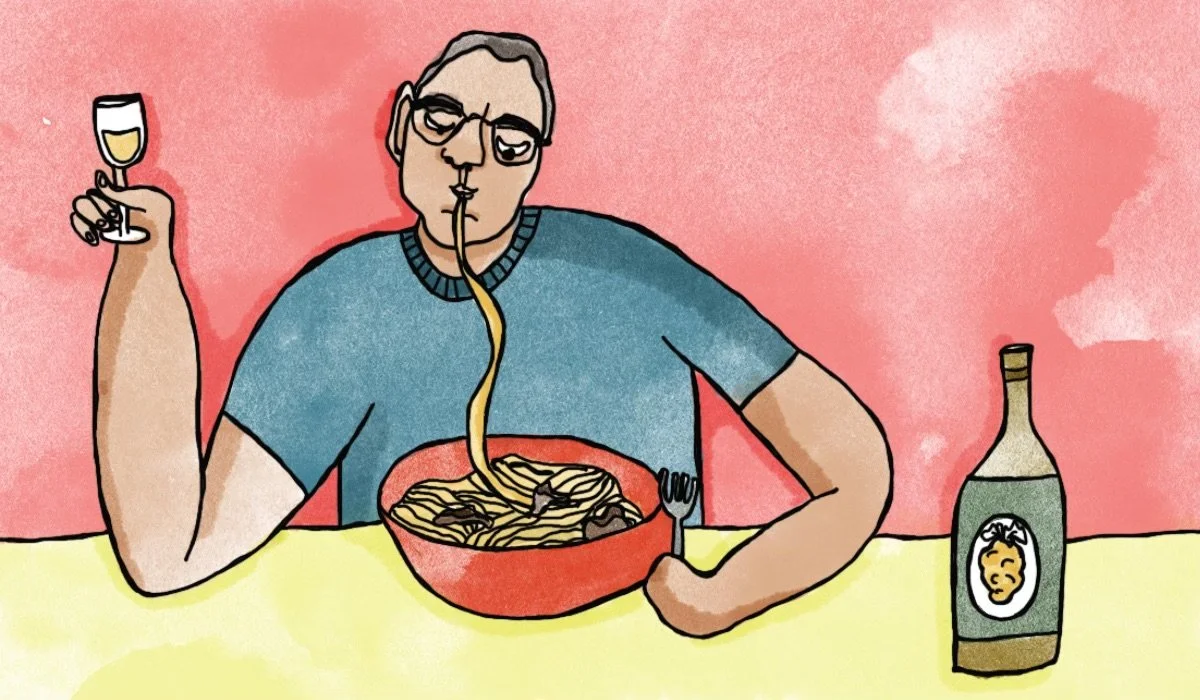My Pasta, My Rules: Why Wine Is My Secret Ingredient
Ivan Orkin, chef and founder of Ivan Ramen, on giving aglio e olio a Japanese spin and making wine than a drink in the kitchen.
Written by Ivan Orkin
Illustration by Cerise Zelenetz
My kitchen is where I really get to play with food. It is a place where I mix and match ideas, and figure out how different ingredients can come together to make something new. For me, it is not about following a cookbook word for word; it is about finding that sweet spot, that unexpected combination that just clicks. A dish that sums up how I cook is my Maitake & Shirasu Pasta with Shiso — my Japanese spin on a classic aglio e olio, full of savory goodness, bright herbs, and just plain satisfying.
I am a pasta fan, no doubt about it, but I rarely stick to the old Italian script. In fact, when I opened my first ramen shop in Tokyo, I started making my own noodles from scratch, and that really got me hooked on all kinds of pasta. This particular bowl? It hits all the right notes: deep savory flavors, a little ocean taste, some fun funk, and a fresh kick. It all starts with maitake mushrooms. I get them nice and crispy in butter, and the smell that fills the kitchen is just awesome. That rich start lays down a good base.
Then comes the part where wine really gets to work its magic. I splash some dry white wine into the pan. My go-to choices for this are usually a Vermentino or a Muscadet. Why those? Because their bright acidity is exactly what you need. They cut through the butter, lift all those bits stuck to the pan, and build a clean base for the flavors to come. It is not just pouring in liquid; it is about pulling out every last bit of flavor, building layers that will make every bite sing. This trick is something I picked up in my cooking school days, learning how wine can be more than just a drink. Wine is a secret weapon for flavor, whether I am making a beef stew or even just some seasoned ground pork. It is about using classic cooking moves, no matter where they come from, to make food taste good, even with ingredients you might not expect. This way of cooking, and thinking about food, has been a big part of my whole career.
Once the wine has cooked down, and its sharp edges mellowed into a subtle, aromatic hum, the al dente spaghetti jumps in. I like my pasta with a bit of chew to it. It soaks up all that mushroom and wine goodness, becoming a canvas for the next ingredient: shirasu. These tiny, salty baby anchovies are a revelation. They bring a clean, ocean taste that makes the dish better without taking over. A good handful, tossed through the pasta, makes sure every strand gets that delicate, salty touch. To finish? A sprinkle of shredded shiso. Its fresh, herbal notes offer a nice contrast, a green lift that brings everything into balance. It is savory, it has that interesting funk, and it is pretty elegant; honestly, it is like Japan and Italy decided to have a noodle party.
This dish, with its mix of richness and acidity, earthiness and ocean flavor, shows how I think about pairing food with wine. My simple rule: do not try to match the same flavors, because then both just get lost. Instead, I look for balance, for combinations where each element brings something out in the other. I’ve always enjoyed the feeling of sitting in a nice restaurant, sipping champagne because it's a simple pleasure that reflects my appreciation for good things. I have seen a change in the food world, too. More chefs are going for a relaxed style, and with that, the old rules about fancy wine with fancy food are loosening up. This opens up possibilities for all sorts of pairings, even a growing respect for beer.
For dishes like my pasta, or even my ramen, acidity is often your best friend. A crisp white or a rosé can clean your palate, making each mouthful taste fresh. The acidity and minerality of a Muscadet or Vermentino, which I use in the pasta, would also be good choices to drink with the pasta, cutting through the richness. For something heartier, like a rich ramen, an off-dry German Riesling or a Spanish Rioja can stand up to those strong flavors. Sometimes, even a red wine like a Petite Sirah can work with saltier dishes. And for those sauced, brothless styles, like Mazemen, a sparkling wine or a cold unfiltered sake can be good for cleaning the palate when things get a bit rich. It is all about making the eating experience balanced and enjoyable.
My work in the kitchen comes from a deep love for food and how ingredients can change. It is about taking on challenges, respecting old traditions, but always trying to add my own twist. And most important, it is about making sure everyone who comes to my place feels welcome and leaves happy. My Maitake & Shirasu Pasta, just like my ramen, shows that – it is a dish that is well-made and nice, but also a friendly hello. That same feeling guides how I use wine, whether it is a secret ingredient in a sauce or the right drink to go with a bowl of noodles. It is about making a complete, satisfying, and memorable moment, one slurp and one sip at a time.

